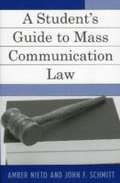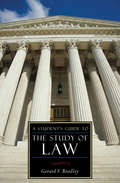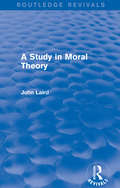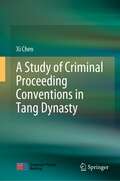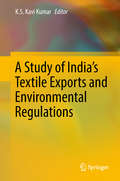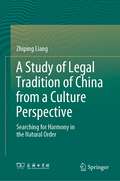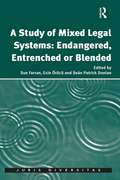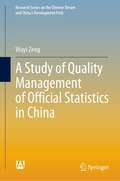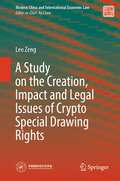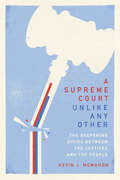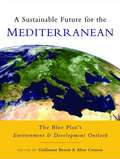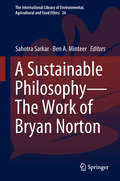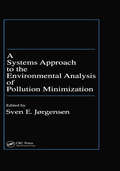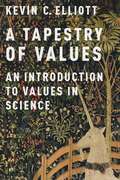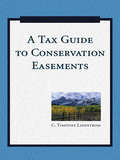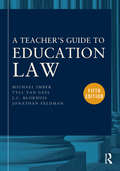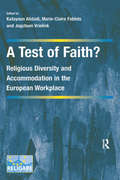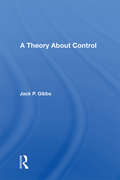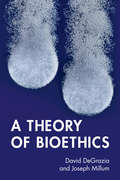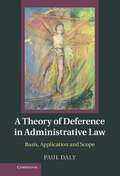- Table View
- List View
A Student's Guide to Mass Communication and Law
by Amber Nieto John F. SchmittA unique learning tool for students in journalism and mass communication, A Student's Guide to Mass Communication Law is written for students by a top student. Amber Nieto and her professor John F. Schmitt who also brings his experience as a lawyer and a journalist have created an easy-to-read study guide to be used alongside any main textbook on media law or communication law. An outline format allows for quick reference and for instructors to choose material useful to their courses. Including a glossary and the text of the U. S. Constitution, this concise guide covers key areas such as free speech, freedom of the press, censorship, the student press, defamation and libel, privacy, intellectual property, fair trial issues, shield laws, freedom of information, obscenity, electronic media regulation, media ownership, and advertising. A Student's Guide helps students understand textbook material and serves as an ongoing refresher course on the basics of mass communication law and media law.
A Student's Guide to the Study of Law (ISI Guides to the Major Disciplines)
by Gerard V. BradleyA law professor&’s concise look at legal concepts, landmark cases, and the complex relationship between law and morality. In a society in which courts, and hence lawyers, have achieved extraordinary power, it is not surprising that the discipline of law is contentious and controversial. In A Student&’s Guide to the Study of Law, Gerard V. Bradley, professor of law at the University of Notre Dame Law School and an expert in the areas of constitutional law and law and religion, introduces readers to the major concepts, cases, and thinkers that have shaped American legal scholarship and history. He also helps readers better understand what, at bottom, is at stake in the different understandings of the nature of law that drive many of our national debates.
A Study in Moral Theory (Routledge Revivals)
by John LairdFirst published in 1926, this study addresses the theory of morality using four overarching approaches: analytical, psychological, theoretical, and finally, philosophical. Within these methodologies, chapters explore such areas as the character of moral enquiry, the knowledge of good and evil, freedom and self-determination and moral philosophy. This is an interesting reissue, which will be of particular value to students researching the philosophy of ethics and morality.
A Study of Criminal Proceeding Conventions in Tang Dynasty
by Xi ChenThis book uses the monographic study of litigation subjects, prosecution, trial, and enforcement to reveal the formation, operation, and development of criminal proceeding conventions in the Tang Dynasty. It also outlines the combination, coordination, and interaction of rules, conventions, and ideas in the traditional Chinese legal system, and presents an overview of the evolution and development of traditional litigation in China. This book is intended mainly for scholars and graduate and undergraduate students in the fields of law and Chinese history.
A Study of India's Textile Exports and Environmental Regulations
by K.S. Kavi KumarThis book examines the interplay between trade and the environment, with a focus on the Indian textile sector. While it is often claimed that developed countries' non-tariff trade measures adversely affect the trade prospects of developing countries, establishing that claim systematically is a challenging task. This book examines the dilemma on the basis of various approaches, including a primary survey of different stakeholders and the large-scale modelling of the economy-environment inter-linkages. The interplay between the costs involved in meeting environmental regulations and the potential price-premiums that the cleaner products would get in the international market is analysed in order to assess the future trade prospects for Indian textiles. In addition, the book provides a comprehensive overview of the present scenario of the Indian textile sector. Accordingly, it will be of great interest to researchers, policy makers and graduate students specializing in environmental economics, development economics and international economics.
A Study of Legal Tradition of China from a Culture Perspective: Searching for Harmony in the Natural Order
by Zhiping LiangProfessor Zhiping Liang offers a new understanding of Chinese legal tradition in this profoundly influential book. Unlike the available literature using the usual method of legal history research, this book attempts to illustrate ancient Chinese legal tradition through cultural interpretation. The author holds that both the concept and practice of law are meaningful cultural symbols. The law reveals not only the life pattern in a specific time and space but also the world of the mind of a specific group of people. Therefore, just as cultures have different types, laws embedded in different societies and cultures also have different characters and spirits. Believing that human experience is often condensed into concepts, categories, and classifications, the author begins his discussion with the analysis of relevant terms and then seeks to understand history by interpreting the interaction and interconnectedness of the words, ideas, and practices. Based on the same understanding, the author uses modern concepts reflectively and critically, consciously exploiting the differences between ancient and contemporary Chinese and Western concepts to achieve a more realistic understanding of history while avoiding the ethnocentrism and modern-centrism common in historical studies.
A Study of Mixed Legal Systems: Endangered Entrenched Or Blended (Juris Diversitas)
by Sue Farran Esin ÖrücüA Study of Mixed Legal Systems: Endangered, Entrenched, or Blended takes the reader on a fascinating voyage of discovery. It includes case studies of a number of systems from across the globe: Cyprus, Guyana, Jersey, Mauritius, Philippines, Quebec, St Lucia, Scotland, and Seychelles. Each combines its legal legacies in novel ways. Large and small, in Europe and beyond, some are sovereign, some part of larger political units. Some are monolingual, some bilingual, some multilingual. Along with an analytical introduction and conclusion, the chapters explore the manner in which the elements of these mixed systems may be seen to be ’entrenched’, ’endangered’, or ’blended’. It explores how this process of legal change happens, questions whether some systems are at greater risk than others, and details the strategies that have been adopted to accelerate or counteract change. The studies involve consideration of the colourful histories of the jurisdictions, of their complex relationships to parent legal systems and traditions, and of language, legal education and legal actors. The volume also considers whether the experiences of these systems can tell us something about legal mixtures and movements generally. Indeed, the volume will be helpful both for scholars and students with a special interest in mixed legal systems as well as anyone interested in comparative law and legal history, in the diversity and dynamism of law.
A Study of Quality Management of Official Statistics in China (Research Series on the Chinese Dream and China’s Development Path)
by Wuyi ZengThis book focuses on how to improve the quality management of official statistics in China. Official statistics help to build an overview of China’s social and economic development and play an important role in policymaking for government as well as in decision-making for enterprises. Because of the great value in reference, the quality of official statistics also constitutes the concern from the public. This book summarizes three levels for understanding the concept of the quality of official statistics and analyzes possible affections from social and economic environment, political and management perspectives. Government statistical data is an important information reflecting China’s economic and social development, an important tool for Party committees at all levels, governments, enterprises and the public to understand and grasp China’s economic operation and social development, an important basis for Party committees and governments at all levels to conduct economic and social management and decision-making and an important reference for enterprises and the public to make decisions on production, operation, investment and consumption. Therefore, the government, enterprises and the public at all levels are demanding more and more government statistics. Accordingly, the quality of government statistical data is becoming more and more important, because it concerns the objectivity and accuracy of government statistical data, the scientificity of economic and social management, the decision-making of Party committees, the correctness of production, operation, investment and consumption decisions of enterprises and the public. Therefore, the quality of government statistical data is extremely important, which is not only the focus of social concern, but also the core issue of government statistics.
A Study on the Creation, Impact and Legal Issues of Crypto Special Drawing Rights (Modern China and International Economic Law)
by Leo ZengThis book analyzes the concept, theory, rules, and impact of the reform of the international monetary system and Crypto-SDRs and provides a feasibility analysis of the combination of blockchain technology and SDRs. It explores and summarizes the possibility of solving problems such as the inherent defects of the current international monetary system and creatively suggests that the birth of Crypto-SDR will have a positive impact on countries and industries and fields around the world, especially in anti-money laundering, cross-border asset recovery, international payments, banking, insurance, financial auditing, Fintech regulation, etc.
A Supreme Court Unlike Any Other: The Deepening Divide Between the Justices and the People
by Kevin J. McMahonA data-rich examination of the US Supreme Court's unprecedented detachment from the democratic processes that buttress its legitimacy. Today’s Supreme Court is unlike any other in American history. This is not just because of its jurisprudence but also because the current Court has a tenuous relationship with the democratic processes that help establish its authority. Historically, this “democracy gap” was not nearly as severe as it is today. Simply put, past Supreme Courts were constructed in a fashion far more in line with the promise of democracy—that the people decide and the majority rules. Drawing on historical and contemporary data alongside a deep knowledge of court battles during presidencies ranging from FDR to Donald Trump, Kevin J. McMahon charts the developments that brought us here. McMahon offers insight into the altered politics of nominating and confirming justices, the shifting pool of Supreme Court hopefuls, and the increased salience of the Court in elections. A Supreme Court Unlike Any Other is an eye-opening account of today’s Court within the context of US history and the broader structure of contemporary politics.
A Sustainable Future for the Mediterranean: The Blue Plan's Environment and Development Outlook
by Lucien Chabason'Here's a work arriving just at the right moment and contributingnew insights at precisely the time when public opinion remains sceptical of the not very promising future we are preparing for our children, when governments balk at explaining to their electorates the vital but unpopular decisions that have to be taken and when civil society, with few ways and means, is finally becoming involved. This remarkable work will help all actors to understand the inter-linkages between economic activities and the environment in the Mediterranean Basin and take concerted, effective action to build a positive, sustainable future' Mohamed Ennabli, former Minister of the Environment and Land Use Panning, Tunisia 'The Blue Plan has carried out a remarkable assessment of the serious environmental probems and insufficiently targeted cooperation in the Mediterranean, and also of new financing systems to be implemented, which would increase the capacities of local authorities and economic and social partners' Georges Corm, former Minister of Finance, Lebanon The Mediterranean Basin and its surrounding countries is a microcosm of the environmental and sustainability challenges facing people across the world. Depending on the development path it takes in the future, the region can either become a positive model for the regional regulation of globalization, or, more onerously, it might reinforce global instability. This unique volume is the definitive, authoritative assessment of the environment and development of the Mediterranean Basin and its 22 countries and territories, spanning five decades from 30 years in the past to 20 years into the future. Produced by the Blue Plan within the framework of UNEP/Mediterranean Action Plan and backed by the EU and national governments, it brings together the work of more than 100 researchers from dozens of national, regional and local governments and research groups into the only comprehensive insight into sustainable development issues in the region. Core coverage includes water, energy, transport, cities, rural and coastal areas, as well as related issues such as climate change, population growth, geopolitical changes, unemployment and poverty, pollution, economic and environmental policies, regional cooperation and the Euro-Mediterranean Partnership. Information is clearly presented through hundreds of full-colour maps, graphs, tables and a wealth of case studies. This is a must-have reference for all levels of government, NGOs and libraries, as well as practitioners, academics and businesses involved in economics, natural resource management, land and maritime transport, water, energy, infrastructure, urban and rural development, agriculture, fishing and aquaculture, tourism and coastal management. Countries and territories covered: Spain, France, Italy, Monaco, Malta, Cyprus, Slovenia, Croatia, Bosnia-Herzegovina, Serbia and Montenegro, Albania, Greece, Turkey, Syria, Lebanon, Palestinian Territories, Israel, Egypt, Libya, Tunisia, Algeria and Morocco. Preface by Lucien Chabason, Chairman of the Blue Plan.
A Sustainable Philosophy—The Work of Bryan Norton (The International Library of Environmental, Agricultural and Food Ethics #26)
by Ben A. Minteer Sahotra SarkarThis book provides a richly interdisciplinary assessment of the thought and work of Bryan Norton, one of most innovative and influential environmental philosophers of the past thirty years. In landmark works such as Toward Unity Among Environmentalists and Sustainability: A Philosophy of Adaptive Ecosystem Management, Norton charted a new and highly productive course for an applied environmental philosophy, one fully engaged with the natural and social sciences as well as the management professions. A Sustainable Philosophy gathers together a distinguished group of scholars and professionals from a wide array of fields (including environmental philosophy, natural resource management, environmental economics, law, and public policy) to engage Norton’s work and its legacy for our shared environmental future. A study in the power of intellectual legacy and the real-world influence of philosophy, the book will be of great interest scholars and students in environmental philosophy, public policy and management, and environmental and sustainability studies. By considering the value and impact of Norton’s body of work it will also chart a course for the next generation of pragmatic environmental philosophers and sustainability scholars grappling with questions of environmental value, knowledge, and practice in a rapidly changing world.
A Systems Approach to the Environmental Analysis of Pollution Minimization
by Sven E. JorgensenThe environmental analysis of pollution problems always involves the use of mass and energy balances to quantify the extent of pollution and its sources. This same form of analysis can be applied to ecosystems, production systems, a whole country or a region. A Systems Approach to the Environmental Analysis of Pollution Minimization identifies and describes the common factors shared by these systems.The book is organized in twelve chapters and progresses from general concepts to specific assessment methods. Chapter one is a general introduction to environmental management principles. Chapter two discusses conservation principles and their applications to environmental health. Chapters three and four explore ecosystem health, properties and analysis. Chapters five through eleven present different methods of analysis including Green Accounting, Clean Technology, Life Cycle Analysis, and Risk Assessment. Editor Sven Jorgensen closes the book with a sweeping summary. Jorgensen is a internationally published authority on the use and analysis of ecosystem models. His new book is a comprehensive guide for both students and professionals. A Systems Approach to the Environmental Analysis of Pollution Minimization is an invaluable contribution.Features
A Tale of Two Murders: Passion and Power in Seventeenth-Century France
by James R. FarrAs scandalous as any modern-day celebrity murder trial, the "Giroux affair" was a maelstrom of intrigue, encompassing daggers, poison, adultery, archenemies, servants, royalty, and legal proceedings that reached the pinnacle of seventeenth-century French society. In 1638 Philippe Giroux, a judge in the highest royal court of Burgundy, allegedly murdered his equally powerful cousin, Pierre Baillet, and Baillet's valet, Philibert Neugot. The murders were all the more shocking because they were surrounded by accusations (particularly that Giroux had been carrying on a passionate affair with Baillet's wife), conspiracy theories (including allegations that Giroux tried to poison his mother-in-law), and unexplained deaths (Giroux's wife and her physician died under suspicious circumstances). The trial lasted from 1639 until 1643 and came to involve many of the most distinguished and influential men in France, among them the prince of Cond, Henri II Bourbon; the prime minister, Cardinal Richelieu; and King Louis XIII. James R. Farr reveals the Giroux affair not only as a riveting murder mystery but also as an illuminating point of entry into the dynamics of power, justice, and law in seventeenth-century France. Drawing on the voluminous trial records, Farr uses Giroux's experience in the court system to trace the mechanisms of power--both the formal power vested by law in judicial officials and the informal power exerted by the nobility through patron-client relationships. He does not take a position on Giroux's guilt or innocence. Instead, he allows readers to draw their own conclusions about who did what to whom on that ill-fated evening in 1638.
A Tapestry of Values: An Introduction to Values in Science
by Kevin Elliott<p>The role of values in scientific research has become an important topic of discussion in both scholarly and popular debates. Pundits across the political spectrum worry that research on topics like climate change, evolutionary theory, vaccine safety, and genetically modified foods has become overly politicized. At the same time, it is clear that values play an important role in science by limiting unethical forms of research and by deciding what areas of research have the greatest relevance for society. Deciding how to distinguish legitimate and illegitimate influences of values in scientific research is a matter of vital importance. <p>Recently, philosophers of science have written a great deal on this topic, but most of their work has been directed toward a scholarly audience. This book makes the contemporary philosophical literature on science and values accessible to a wide readership. It examines case studies from a variety of research areas, including climate science, anthropology, chemical risk assessment, ecology, neurobiology, biomedical research, and agriculture. These cases show that values have necessary roles to play in identifying research topics, choosing research questions, determining the aims of inquiry, responding to uncertainty, and deciding how to communicate information. <p>Kevin Elliott focuses not just on describing roles for values but also on determining when their influences are actually appropriate. He emphasizes several conditions for incorporating values in a legitimate fashion, and highlights multiple strategies for fostering engagement between stakeholders so that value influences can be subjected to careful and critical scrutiny.</p>
A Target on my Back: A Prosecutor's Terrifying Tale of Life on a Hit List
by Erleigh WileyMurders don't happen in Kaufman County, Texas, a sleepy community where people raise their kids quietly and drive into Dallas for work and entertainment. In 2013, murder came to town when two professional prosecutors were slain in cold blood, simply for doing their jobs: one in broad daylight in plain view of the courthouse, and one in his home, along with his wife. Eric Williams is responsible for all the bloodshed, and he has a list of who to kill next.A Target on My Back is the first-person true story of Erleigh Wiley, an accomplished lawyer who accepted the job as the new district attorney, after the death of her predecessors, which turned her into the next target on the killer's hit list. This is her story of how she and her family endured the storm of the press, the array of Homeland Security agents assigned to protect them 24/7, and the weight of knowing she was someone's prey. Though fearing for her life, she served as the prosecution's final witness against the murderer, sealing his fate on death row. This chilling account of how she survived the hit list is a terrifying cat and mouse tale.
A Tax Guide to Conservation Easements
by C. Timothy LindstromVoluntary land conservation, resulting from increasingly alluring tax benefits, has significantly changed the face of land use in the United States and promises to have an even more significant influence in the future. There are more than 1,500 land trusts in the U.S. today, involving millions of acres of land that have been permanently protected by conservation easements. Most of these land trusts depend heavily upon the significant tax benefits offered by the federal tax code as an incentive for voluntary land conservation. However, only a very small percentage of land trust personnel, landowners, or even government officials fully understand the complexity of the requirements for these tax benefits. This is a comprehensive book on the tax benefits of the charitable contribution, or bargain sale, of a conservation easement. It provides a detailed explanation of the complex and extensive requirements of the federal tax code and related concepts, including the rules governing the operation of tax-exempt organizations such as land trusts. Clearly written, systematic in its coverage, it is intended to be of value for anyone who deals with land trust issues as well as interested lay people. Structured for easy reference, A Tax Guide to Conservation Easements is designed to be used as a resource tool. Related topics are cross-referenced throughout. All principles in the book are illustrated with one or more useful examples. The tax benefits of contributing a conservation easement are unquestionably the heart of voluntary land conservation today. Knowledge of the tax law relating to land trusts and conservation easements is vital to properly establishing and managing land trusts and to insuring the tax deductibility of conservation easements. The future of voluntary land conservation is dependent on a clear understanding of tax policy. Complete, meticulous, and up to date, A Tax Guide to Conservation Easementsis an essential handbook.
A Teacher's Guide to Education Law
by Tyll Van Geel Michael Imber Jonathan Feldman J. C. BlokhuisAdapted from its parent volume Education Law, 5th Edition, this accessible text concisely introduces topics in law that are most relevant to teachers. Providing public school teachers with the legal knowledge necessary to do their jobs, A Teacher’s Guide to Education Law covers issues of student rights, discipline, negligence, discrimination, special education, teacher rights, hiring and firing, contracts, unions, collective bargaining, and tenure. Special Features: This revised edition includes new content on bullying, privacy, discrimination, school finance, and issues relating to Internet and technology, as well as updated references and case law throughout. To aid comprehension, technical terms are carefully explained and summaries of key topics and principles are provided. Case law is presented within the context of real-world examples, making this text accessible to pre-service teachers who have little background in law. A companion website provides additional resources for students and instructors, such as links to full cases and a glossary of key concepts.
A Technomoral Politics: Good Governance, Transparency, and Corruption in India
by Aradhana SharmaExamining anticorruption battles and transparency laws to ask: what makes for good governance, and can it limit liberal democratic politics as much as encourage it? Good governance is meant to empower citizens, increase democratic participation, and make states transparent and accountable, yet this liberal democratic imperative can also promote populist authoritarian rule. Bringing together discourses on ethical goodness with the technicalities of governance as expressed in laws and policies, Aradhana Sharma develops the concept of &“technomoral politics&” to navigate this fraught topic. With a focus on the work of activists, citizens, and state officials, she offers an ethnographic account of the contradictions and dangers of good-governance politics in twenty-first-century India. A Technomoral Politics follows the evolution of a group of activists in New Delhi led by Arvind Kejriwal from 2008 to 2014 as they morphed from a protransparency NGO to a mass movement against state corruption to a populist party that promised to change the political system through laws and policies. Sharma explores the technomoral framing of state opacity and corruption as well as the limits of the law in resolving these issues, probing such themes as the contradictory relationship between transparency and bureaucracy and the classed and gendered nature of democratic state institutions. By examining scalar dimensions of good-governance politics, from the hyperlocal work of activists to global trends, A Technomoral Politics illuminates the paradoxes, limits, and risks of a system that is meant to spread liberal democratic principles but that also ends up promoting antidemocratic, populist-authoritarian forms of rule. Retail e-book files for this title are screen-reader friendly.
A Terrible Love of War
by James HillmanWar is a timeless force in the human imagination—and, indeed, in daily life. Engaged in the activity of destruction, its soldiers and its victims discover a paradoxical yet profound sense of existing, of being human. In A Terrible Love of War, James Hillman, one of today’s most respected psychologists, undertakes a groundbreaking examination of the essence of war, its psychological origins and inhuman behaviors. Utilizing reports from many fronts and times, letters from combatants, analyses by military authorities, classic myths, and writings from great thinkers, including Twain, Tolstoy, Kant, Arendt, Foucault, and Levinas, Hillman’s broad sweep and detailed research bring a fundamentally new understanding to humanity’s simultaneous attraction and aversion to war. This is a compelling, necessary book in a violent world.
A Test of Faith?: Religious Diversity and Accommodation in the European Workplace (Cultural Diversity and Law in Association with RELIGARE)
by Marie-Claire Foblets Katayoun Alidadi Jogchum VrielinkIssues of religious diversity in the workplace have become very topical and have been raised before domestic courts and the European Court of Human Rights. Examining the controversial and constantly evolving position of religion in the workplace, this collection brings together chapters by legal and social science scholars and provides a wealth of information on legal responses across Europe, Turkey and the United States to conflicts between professional and religious obligations involving employees and employers. The contributors examine how case law from the European Court of Human Rights, domestic experiences and comparative analyses can indicate trends and reveal established and innovative approaches. This multi-perspective volume will be relevant for legal practitioners, researchers, academics and policy-makers interested in human rights law, discrimination law, labour law and the intersection of law and religion.
A Theory About Control
by Jack P. GibbsMoving beyond his 1989 book, Control: Sociology's Central Notion, Jack Gibbs develops in this new book a comprehensive theory of control in all its biological, technological, and human dimensions. His treatment goes beyond conventional ideas about social control to show why self-control and proximate control are essential to understanding human interaction. He also argues that thinking of control in terms of the counteraction of deviance is insufficient. Tests of Gibbs's control theory, based on data from sixty-six countries, add credence to his claim that control could be the central notion for sociology and perhaps for other social sciences.
A Theory of Bioethics
by David DeGrazia Joseph MillumThis volume offers a carefully argued, compelling theory of bioethics while eliciting practical implications for a wide array of issues including medical assistance-in-dying, the right to health care, abortion, animal research, and the definition of death. The authors' dual-value theory features mid-level principles, a distinctive model of moral status, a subjective account of well-being, and a cosmopolitan view of global justice. In addition to ethical theory, the book investigates the nature of harm and autonomous action, personal identity theory, and the 'non-identity problem' associated with many procreative decisions. Readers new to particular topics will benefit from helpful introductions, specialists will appreciate in-depth theoretical explorations and a novel take on various practical issues, and all readers will benefit from the book's original synoptic vision of bioethics. This title is also available as Open Access on Cambridge Core.
A Theory of Deference in Administrative Law
by Paul DalyIn the modern administrative state, hundreds if not thousands of officials wield powers that can be used to the benefit or detriment of individuals and corporations. When the exercise of these powers is challenged, a great deal can be at stake. Courts are confronted with difficult questions about how to apply the general principles of administrative law in different contexts. Based on a comparative theoretical analysis of the allocation of authority between the organs of government, A Theory of Deference in Administrative Law provides courts with a methodology to apply no matter how complex the subject matter. The firm theoretical foundation of deference is fully exposed and a comprehensive doctrine of curial deference is developed for application by courts in judicial review of administrative action. A wide scope is urged, spanning the whole spectrum of government regulation, thereby ensuring wide access to public law remedies.
A Theory of Fairness and Social Welfare
by Marc Fleurbaey François ManiquetThe definition and measurement of social welfare have been a vexed issue for the past century. This book makes a constructive, easily applicable proposal and suggests how to evaluate the economic situation of a society in a way that gives priority to the worse-off and that respects each individual's preferences over his or her own consumption, work, leisure, and so on. This approach resonates with the current concern to go "beyond the GDP" in the measurement of social progress. Compared to technical studies in welfare economics, this book emphasizes constructive results rather than paradoxes and impossibilities, and shows how one can start from basic principles of efficiency and fairness and end up with concrete evaluations of policies. Compared to more philosophical treatments of social justice, this book is more precise about the definition of social welfare and reaches conclusions about concrete policies and institutions only after a rigorous derivation from clearly stated principles.
